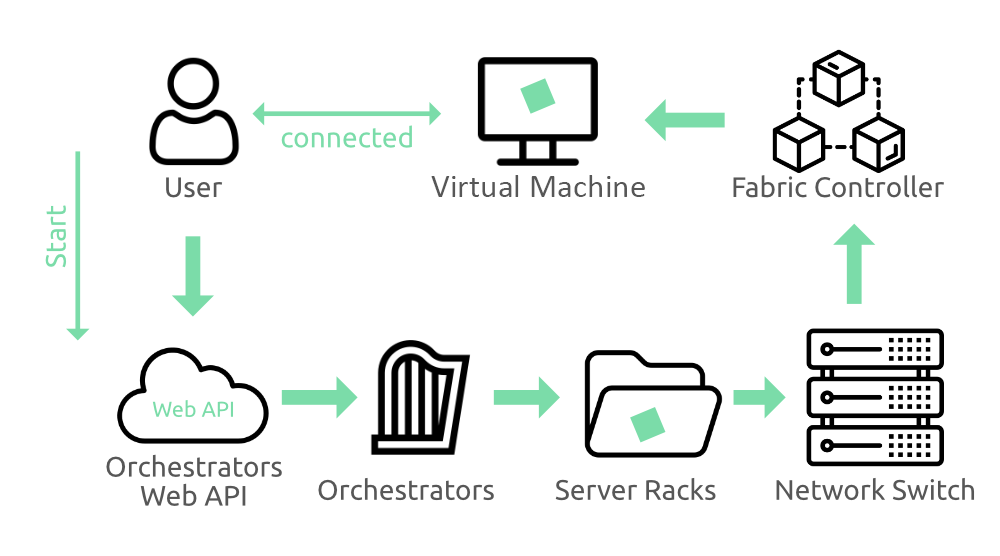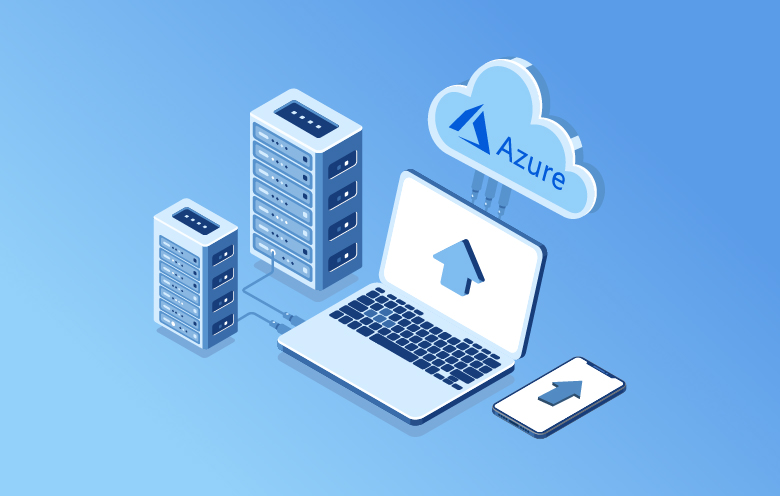INTRODUCTION
Microsoft created the Azure cloud computing platform, which offers a variety of services for creating, distributing, and managing applications and services over a vast network of data centers. Azure provides a range of tools and services to assist developers and businesses in managing their cloud-based apps and services.
The ability to develop, deploy, and manage applications and services in a flexible and scalable manner is one of Azure’s primary advantages. This is so that apps and services may be developed and deployed on any device, any platform, and any cloud thanks to the extensive set of tools and services that Azure offers.
How Azure Technology Works?
Azure is a cloud computing platform developed by Microsoft that provides a wide range of services for building, deploying, and managing applications and services through a global network of data centers. Here’s how Azure technology works:

- Infrastructure: Azure provides a vast infrastructure of physical servers, storage devices, and networking equipment that are located in Microsoft’s data centers around the world. These resources are managed by Microsoft and are used to host applications and services in the cloud.
- Virtual Machines: Azure offers virtual computers that can be used to run cloud-based programmes and services. These virtual machines are created using templates and can be customized to match the needs of your application.
- Services: Azure provides a wide range of services that can be used to build and deploy applications and services in the cloud. These services include platform as a service (PaaS), software as a service (SaaS), storage, big data and analytics, machine learning, internet of things (IoT), and DevOps tools.
- Management: Azure provides a web-based management portal that can be used to manage your applications and services in the cloud. You can use this portal to create and manage virtual machines, deploy applications, and monitor your services.
- Integration: Azure integrates with a wide range of other Microsoft products and services, including Office 365, Dynamics 365, and Power BI. This integration allows businesses to leverage their existing Microsoft investments and create a seamless experience for their users.
- Security: Azure provides a wide range of security features, including firewalls, threat detection, and data encryption. These features are designed to protect your applications and data from cyber threats.
- Global Reach: Azure has a global network of data centers located in over 60 regions around the world. This allows businesses to deploy their applications and services closer to their users, which can improve performance and reduce latency.
Key Features of Azure
Azure has many important characteristics, including:
- Infrastructure as a Service (IaaS) – Azure provides virtual machines and other infrastructure resources that can be used to build and deploy applications and services.
- Platform as a Service (PaaS) – Azure provides a platform for building and deploying web applications, mobile applications, and other services.
- Software as a Service (SaaS) – Azure provides a range of software applications and services that can be used to build and deploy enterprise applications.
- Storage – Azure provides a range of storage services that can be used to store data and files in the cloud.
- Big Data and Analytics – Azure provides a range of big data and analytics services that can be used to process large amounts of data.

- Machine Learning – Azure provides a range of machine learning services that can be used to build and deploy machine learning models.
- Internet of Things (IoT) – Azure provides a range of IoT services that can be used to connect and manage IoT devices.
- DevOps – Azure provides a range of DevOps tools and services that can be used to automate the deployment and management of applications and services.
- Security – Azure provides a range of security services that can be used to secure applications and services in the cloud.
In addition to these features, Azure also offers a range of tools and services that can be used to integrate with other Microsoft products and services, such as Office 365, Dynamics 365, and Power BI.
Applications of Azure Technology
Azure technology offers a wide range of applications across industries and business functions. Here are some of the common applications of Azure:
- Application Development: Azure offers a variety of services for application development, including virtual machines, containers, and serverless computing. These services enable developers to create, test, and deploy applications quickly and efficiently.
- Data Storage and Analytics: Azure provides services for data storage, including databases, file storage, and backup and recovery. It also offers big data and analytics services, including data processing, machine learning, and predictive analytics.
- Internet of Things (IoT): Azure offers services for IoT, including device management, data ingestion, and analytics. These services enable businesses to connect and manage their IoT devices and use the data they generate to make informed decisions.
- DevOps: Azure provides services for DevOps, including continuous integration and continuous deployment (CI/CD), source control, and testing. These services enable businesses to automate their software development and deployment processes, reducing time to market and improving efficiency.
- Artificial Intelligence (AI): Azure offers AI services, including cognitive services and machine learning. These services enable businesses to leverage AI to improve customer experiences, automate processes, and make better decisions.
- Web and Mobile Applications: Azure provides services for building and deploying web and mobile applications, including web hosting, mobile app development, and backend services.
- Hybrid Cloud: Azure offers services for hybrid cloud, enabling businesses to connect their on-premises infrastructure to the cloud. This enables businesses to take advantage of the benefits of the cloud while maintaining their existing IT investments.
Pros and Cons of Azure Technology
Pros:
- Scalability: One of the biggest advantages of Azure is its scalability. With Azure, you can easily scale up or down your resources to match the demand of your application. This makes it easy to handle sudden spikes in traffic without having to worry about downtime or performance issues.
- Cost-effective: Azure offers a pay-as-you-go model, which means that you only pay for what you use. This makes it a cost-effective solution for businesses of all sizes.
- Flexibility: Azure supports a wide range of programming languages, operating systems, and frameworks. This makes it easy to build and deploy applications using your preferred tools and technologies.
- Reliability: Azure has a global network of data centers, which ensures high availability and reliability. This means that your application will be up and running even in the event of a data center outage.
- Security: Azure offers a wide range of security features, including firewalls, threat detection, and data encryption. This makes it a secure solution for businesses that handle sensitive data.
Cons:
- Complexity: Azure is a complex technology that can be difficult to set up and configure, especially for businesses that are new to the cloud. This can result in a steep learning curve and longer deployment times.
- Vendor lock-in: Azure is a proprietary technology, which means that businesses may be locked into using Microsoft products and services. This can limit their flexibility in terms of choosing other cloud providers or technologies.
- Lack of control: Because Azure is a cloud-based service, businesses have less control over their infrastructure and data. This can make it difficult to troubleshoot issues and enforce security policies.
- Potential downtime: While Azure has a high level of availability, it is not immune to downtime. Businesses that rely on Azure may experience downtime if there is an issue with one of Microsoft’s data centers.
- Additional costs: While Azure offers a pay-as-you-go model, businesses may incur additional costs for certain features and services. This can make it difficult to predict and manage expenses.
Conclusion
Azure is an effective cloud computing platform that offers a variety of tools and services for developing, deploying, and managing cloud-based applications and services. Azure can assist you in doing so in a flexible, scalable, and economical manner, regardless of whether you’re developing a new application or moving an old one to the cloud.

